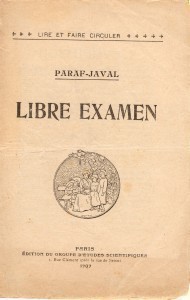We are very grateful to receive this 1907 pamphlet by French anarchist Paraf Javal, donated to Spirit of Revolt by Leonard Fernandez and Katherine MacKenzie. Below you will find links to the French version and an English translation.
In French, Read on line, PDF and other downloads.
English translation HERE.
Information from several sources:
Georges Mathias Paraf-Javal 1858 -1941 is a prolific individualist anarchist who helped found the Anti-Militarist League (1902). It aimed for the removal of all weapons advocating ‘draft dodging as a most effective strategy’. He was a professor of natural sciences, etcher and publicist. In 1900 he met Joseph Albert (Pseudonym Libertad) whom he befriended, collaborating together as activists until Libertad’s death in 1908.
The Antimilitariste League,1902 was eventually to become a subsection of the AIA (International Anti-Militarist Association) founded in Amsterdam by Domela Nieuwenhuis (Dutch Lutheran Preacher and early socialist ) in 1904 that was dedicated to fighting militarism. Although technically open to all political views including socialists, syndicalists, communists and anarchists, it was dominated by anarchists. The members agreed that the workers should revolt if war was declared with the question of whether refusal of military service should be AIA strategy being hotly debated.[5] But AIA disagreed on whether soldiers should desert. Libertad and Paraf-Javal considered the simple call for desertion as too timid, and refused to participate further. The following year it was agreed that the AIA was committed to a workers’ revolution in the event of war, but that it was neutral on the subject of desertion.[8]Of the remaining members subjected to police surveillance 28 were arrested and tried receiving harsh sentences.
In 1902, Paraf-Javal is among the founders of a commune around the ideas of the Society for the creation and development of a free society in France which include Reclus , Jehan Rictus , Descaves Lucien , Maurice Donnay , Henri Zisly , Émile Armand , Georges Deherme. Its aim is to support creation of a libertarian community , Vaux The Glade ( Essômes-sur-Marne , Aisne), dissolved in 1907.
Albert Libertad along with Paraf-Javal, founded the “Causeries populaires”, public discussions that met with great interest throughout the country, contributing to the opening of a bookstore and various clubs in different quarters of Paris”.[4] Paraf-Javal gave “Popular Lectures” bimonthly, especially on the theme of “The organization of happiness”, where he developed his theories on the “universal transformism.” “There is no hope for men to attain happiness by arbitrary inept authority.” Humanity, 1909.Paraf-Javal collaborated on numerous publications including the weekly libertarian L’Anarchie founded in 1905 by Albert Libertad probably the most important individualist anarchist journal, where he was Editor for a while. It “invited citizens to burn their ID papers and to become humans again, refusing to let themselves be reduced to a number, duly filed in the statistic state inventories of slaves.”[5] Feasts, dances and country excursions, the “joy of living” and not as militant sacrifice and death instinct, seeking to reconcile the requirements of the individual (in his need for autonomy) with the need to destroy authoritarian society’.
Paraf-Javal creates a new forum, “The Scientific Study Group” of which this 1907- Libre Examen derives.
After the First World War, Paraf-Javal opens a bookstore in Paris (that of his eldest son died in the war) and continued his lectures, is later initiated into Freemasonry at the lodge “La Montagne” of the Grand Lodge of France in Paris, where he became Worshipful Master in 1930 . In 1935, he dissents and founds the “Grand Lodge of universal brotherhood’.
In addition to being the author of numerous political pamphlets Paraf-Javal wrote arithmetic courses published in Spanish for the Escuela Moderna of Francisco Ferrer, the pacifist libertarian educationalist (also founder of syndicalist journal, Solidaridad Oberera) and executed by the Spanish Government for inciting an uprising, despite being in England at the time in question.
